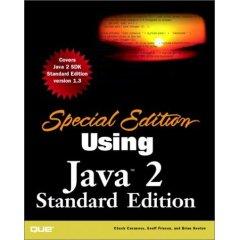| 2020ok Directory of FREE Online Books and FREE eBooks |
Free eBooks > Computers & Internet > Programming > Java > General > Using Java 2 Standard Edition
Using Java 2 Standard Editionby Chuck Cavaness, Brian Keeton, Jeff Friesen, and Joseph Weber  Download Book If you are the author or the publisher, and would like to link to your site here, please contact us. About Book Amazon.com Special Edition: Using Java 2 Standard Edition puts an all-inclusive tutorial on desktop Java development into your hands in one big volume. Chock-full of examples and tips, this one-stop source for learning Java will suit the needs of beginning or intermediate Java developers. This massive, comprehensive guide to Java, weighing in at over 1,100 pages, is dedicated to the principle that more is more. Beginning with basic Java syntax and keywords, the fundamentals of Java are examined in a tour of the basics that is probably as good as any available--in that it mentions important object-oriented design principles early on without getting bogged down in jargon. The book also manages to integrate some Unified Modeling Language (UML)--particularly class diagrams--throughout, making this an up-to-date and effective guide to object-oriented design. Sections on built-in core Java classes for strings, threads, and collections (centering on the new collection classes from Java 2 onward) help build basic Java skills. The book does a good job of exploring user interface design and graphics under both the older Abstract Window Toolkit (AWT) and the new Swing classes. The solid tour of basic image processing and the nicely meticulous tour of user interface components are especially good. Advanced programmers will benefit from the material on the JFC Accessibility APIs; drag-and-drop functionality; and Java Media Framework API (JMF), which permits video and sound streaming. Later sections move on to coverage of network, I/O, and database programming, including a clear explanation of the (sometimes confusing) support for Java streams. Later chapters on JDBC cover the basics while highlighting new features in Java 2 (which permit updating records, for instance). For advanced developers, a closing section on the powerful Java support for reflection (which allows code to "inspect" Java classes at run time and call methods dynamically) rounds out this capable tour. All in all, this text covers virtually all the topics that Java beginners will need in order to use its core features effectively--and, if you're in a hurry, you can read chapter by chapter. --Richard Dragan Topics covered:
Book Description Special Edition Using Java 2 Standard Edition specifically covers only the Standard Edition of version 1.3 of the Java Software Development Kit (SDK). It begins with a series of quick refreshers for Object-oriented programming and Java fundamentals, including applet programming and threads, to ensure that readers are up to speed. The book then moves to intermediate Java features including user interface design with Java Foundation Classes (JFC) and Abstract Windows Toolkit (AWT), data structures and Java utilities, containers and layout managers, and creating images. Later chapters cover advanced topics including Internationalization & creating JAR archive files. Useful appendices offer further Java resources & SDK tool information. Throughout the book, the authors focus on Java 2 Standard Edition SDK version 1.3 changes, including the newest <169>HotSpot<170> compiler, which offers increased performance, faster start-up and smaller memory usage, among other improvements. From the Back Cover Special Edition Using Java 2 Standard Edition specifically covers only the Standard Edition of version 1.3 of the Java Software Development Kit (SDK). It begins with a series of quick refreshers for Object-oriented programming and Java fundamentals, including applet programming and threads, to ensure that readers are up to speed. The book then moves to intermediate Java features including user interface design with Java Foundation Classes (JFC) and Abstract Windows Toolkit (AWT), data structures and Java utilities, containers and layout managers, and creating images. Later chapters cover advanced topics including Internationalization & creating JAR archive files. Useful appendices offer further Java resources & SDK tool information. Throughout the book, the authors focus on Java 2 Standard Edition SDK version 1.3 changes, including the newest “HotSpot†compiler, which offers increased performance, faster start-up and smaller memory usage, among other improvements. About the Author Chuck Cavaness has spent more than 6 years developing large scale object-oriented systems, using Java from its earliest availability. His previous projects included enterprise-scale applications for the banking and travel industries. Geoff Friesen has written numerous articles for JavaWorld and Windows TechEdge and has created Java applications ranging from smart card integration to disassembly. He has taught college-level Java courses and previously wrote Java 2 by Example. Brian Keeton is a Software Engineer with NetVendor, Inc, where he has developed J2EE-based architectures for Internet-based B2B companies. He is a Sun Certified Developer for the Java Platform, and has taught courses in Java and CORBA technologies. Related Free eBooks
| Related Tags |












SEND A COMMENT
PLEASE READ: All comments must be approved before appearing in the thread; time and space constraints prevent all comments from appearing. We will only approve comments that are directly related to the article, use appropriate language and are not attacking the comments of others.